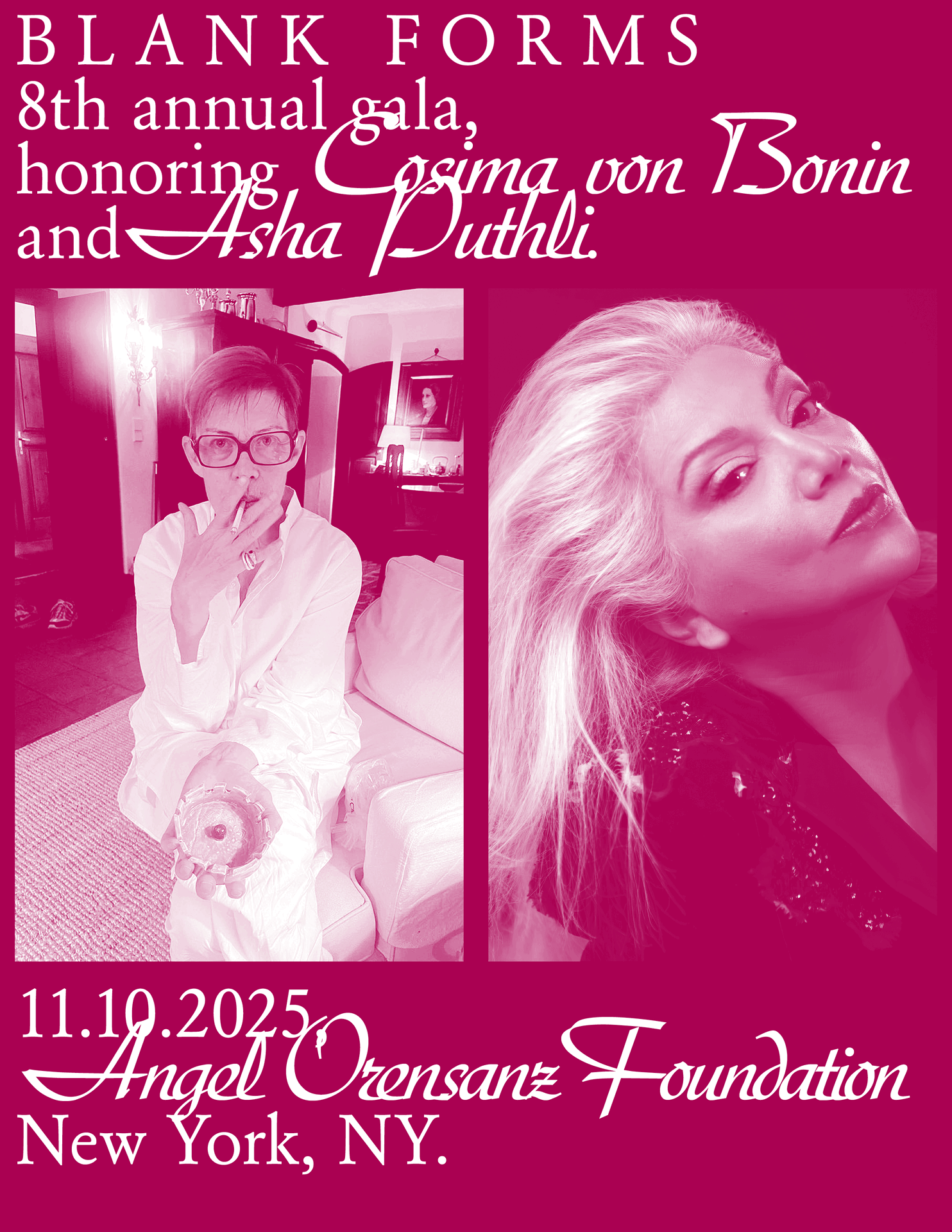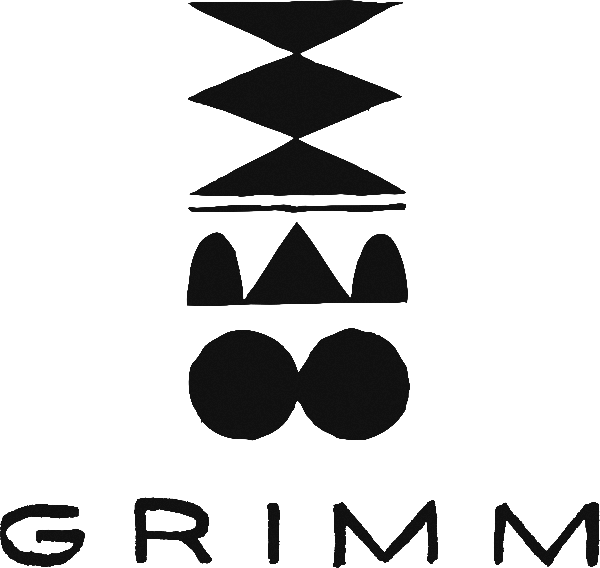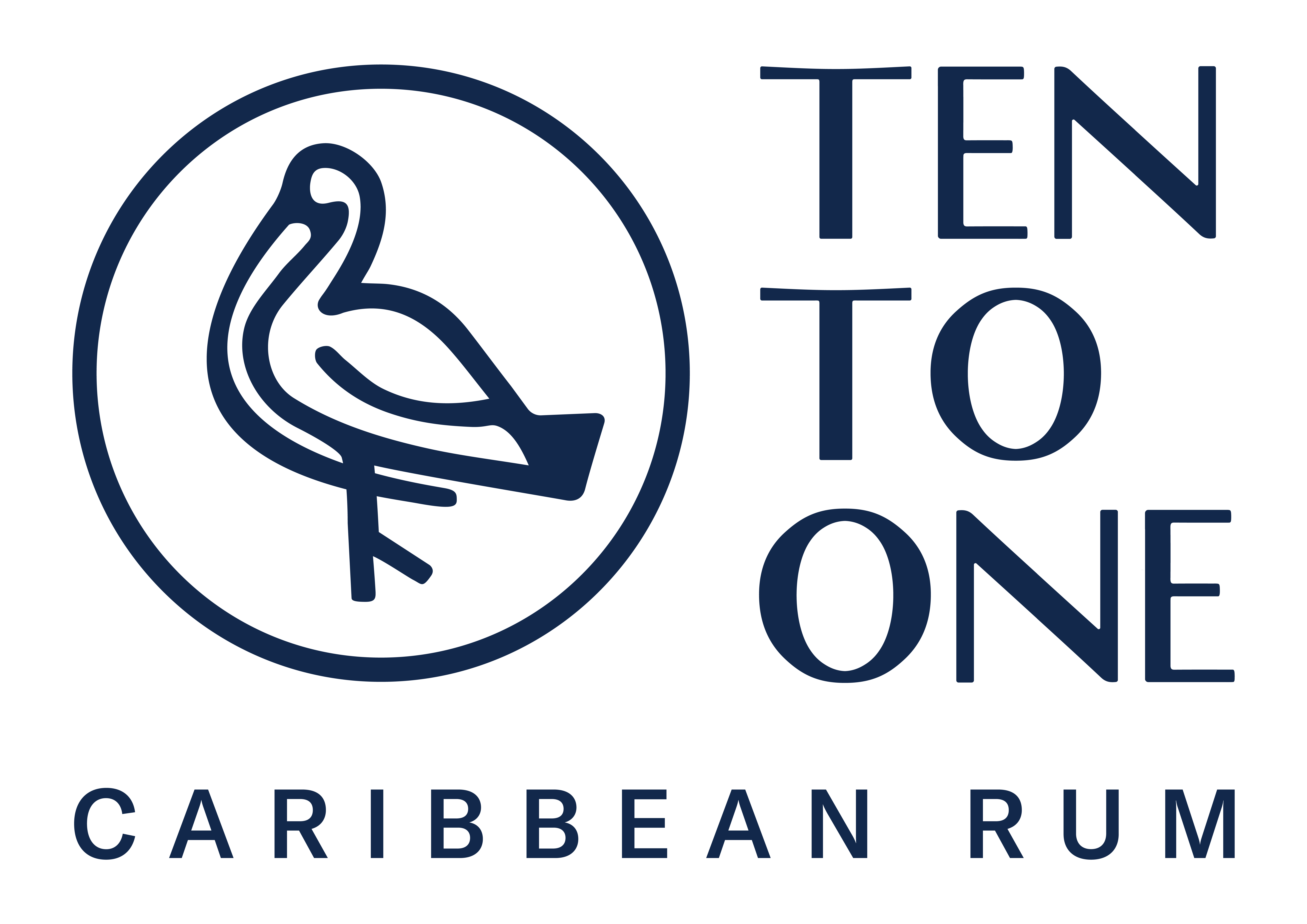Blank Forms 8th Annual Gala Honoring Cosima von Bonin and Asha Puthli

The Angel Orensanz Foundation
New York, NY 10002
On Monday, November 10th, Blank Forms presents its eighth annual benefit gala honoring visionary artists Cosima von Bonin and Asha Puthli. Please join us for cocktails, dinner by Kreung Cambodia, and special performances by Asha Puthli and others.
Across their spectacular, technicolor bodies of work, von Bonin and Puthli embody the revelry and irreverence that is essential to serious artistic innovation. At Blank Forms, which was founded to foster rigorous practices of experimental art and music, we look to their creations as reminders of the profound pleasures of rule-breaking art.
Our yearly gala raises crucial funds for future programs: live performances, exhibitions, archival initiatives, and our publishing imprint, which issues books and records. Blank Forms depends on donor support both to commission new works from emerging artists and to advance the legacies of historically important figures like Maryanne Amacher, Don and Moki Cherry, Catherine Christer Hennix and Jerry Hunt. To help support and for more information about the event, please contact Corinne Daniel: corinne@blankforms.org.
GALA COMMITTEE: Martin Beck, Lizzi Bougatsos, James Cahn & Jeremy Collatz, Walker Carpenter & Jason Chen, Cheswatyr, Lonti Ebers, Andrew Fierberg, Angela Goding, Josephine Graf & Joseph Miller-Gamble, Greene Naftali, Jane Hait & Justin Beal, Rachel Harrison, Eleanor Heyman, Laura Hoffman, Sanya Kantarovsky, Ruba Katrib, Jutta Koether, Michael Krebber, Alexander Lau with Stephen Cheng, Sarah Martin-Nuss & David Nuss, Ryan Muller, Vyjayanthi Rao & Satya Pemmaraju, Lucy Raven & Matthew Barney, Rachel Rose & Ian Cheng, Gryphon Rue, Lucy Sante, Olivia Shao & Richard Aldrich, Anne Simone Kleinman & Thomas Wong, Timmy Simonds, Lise Stolt-Nielsen, Stylus & The Limen Foundation, James Merle Thomas, Henry Threadgill, Jacques Louis Vidal, Kara Walker & Ari Marcopoulos, Mary Wang & Christian Nyampeta.
GALA SPONSORS: Grimm Artisanal Ales, Heritage Wines, Jupiter Sound, Nine Orchard, Source to Bottle, Ten to One Rum, TÖST.
For over five decades, disco mystic ASHA PUTHLI has imbued the liberatory improvisations of Indian classical music and free jazz with her own erotic, ethereal, extraterrestrial style. Born in Mumbai in 1945, she grew up studying polar opposite vocal techniques: the closed, subdued style of Jaipur Gharana, a Hindustani classical tradition, and the heady projections of European opera. The melding of the two yielded her agile four-octave soprano, which shifts between full-throated and feather-light. But emergent forms of popular music also suffused her formative years; through newly available international radio broadcasts, she listened to American jazz and witnessed the Beatles gain acclaim for their decontextualized use of the sitar. By the time she moved to New York in 1969, Puthli was cultivating not only a global musical education, but also a canny sense for her singular position within it.
In New York, Puthli’s artistic practice collided with new genres and industries. She briefly attended the Martha Graham school before being signed by John H. Hammond to CBS Records in 1970. That same year, she toured the country on behalf of the Tea Council of the USA, welcoming young musicians to enter the council’s “search for the new sound” competition. Around the same time, she fell in with Andy Warhol’s Factory scene, becoming close friends and roommates with Warhol superstar Holly Woodlawn, with whom she co-starred in Bad Marion’s Last Year (1971). She sang on two tracks for Ornette Coleman’s Science Fiction (Columbia, 1972), earning a DownBeat award for Best Female Jazz Vocalist, as well as Don Cherry’s soundtrack for Alejandro Jodorowsky’s surrealist film The Holy Mountain (1972). And she continued releasing her own music all the while.
Puthli’s 1976 album The Devil Is Loose perfectly exemplifies her idiosyncratic aesthetic lineage. Of her oeuvre, this album’s influence on the next generations of crate diggers is unmatched. “Space Talk,” a recurring favorite at David Mancuso’s Loft parties, has been continuously reborn in samples by The Notorious B.I.G., G-Unit, the Neptunes, and Jay-Z. But The Devil Is Loose is also a particularly good example of her alchemy of inheritances. Puthli’s professed indebtedness to Black American music—which fueled her own desire to transcend suppression through bold self-expression—is on splendorous display here; witness the funky, squelching basslines of “Flying Fish” and the piano-forward torch song “Good Night.” Yet her particular space-age twist remains unmissable, as on title track “The Devil Is Loose,” which interweaves a luxuriant gospel chorus with piquant, futuristic electronics and fantastical strings. And her slinky, effortless voice—famously imitated by Donna Summer, who first saw Puthli perform Germany in the early 1970s—remains eternally sly and surprising. Puthli pleads, chatters, belts, and trills, inhabiting these varied characterizations with a gleeful theatricality, teasing listeners with her slippery performance of herself: opera-house diva, disco balladeer, untouchable seductress, careless seraphim.
In addition to The Devil Is Loose, Puthli’s solo albums include Asha Puthli (CBS, 1973), She Loves to Hear the Music (CBS, 1975), 1001 Nights of Love (Autobahn/Philips 1979), Hari Om (Sony, 1990), and Lost (Kyrone 2009). As a guest vocalist, she has appeared on Henry Threadgill’s Easily Slip Into Another World (Novus, 1989), Peter Ivers’s 7" “Ain’t That Peculiar” (Epic, 1972) and album Take It Out On Me (Wounded Bird, 2009), and Raveena’s Asha’s Awakening (Warner, 2002), among other releases.
Born in 1962 in the coastal city of Mombasa, Kenya, COSIMA VON BONIN spent her early childhood collecting detritus from the Indian Ocean—a practice that might be mythologized, in retrospect, as an early interest in readymades. She arrived in Cologne in 1986, a few years after Martin Kippenberger popularized a transgressive, self-referential style of art characterized by its unabashed borrowing from other media and by the artist’s role as what critic Diedrich Diederichsen called Selbstdarsteller, or self-performer. In this notoriously social, irreverent atmosphere, von Bonin forged her artistic education. Tending bar at Königswasser or socializing around the city, she came into contact with artists like Albert Oehlen, Isa Genzken, Michael Krebber, and Jutta Koether; at the Walther König bookstore, she read about Marcel Broodthaers and Andrei Cădere, situating herself in a broader history of Conceptual art. In 1990, at Kippenberger’s urging, von Bonin began showing her work publicly. Early exhibitions in Cologne and Hamburg reveal her emergent deadpan approach to appropriation and authorship; in them, von Bonin recreated ads and installations from previous decades, replacing the names of then-contemporary artists with those of her own extended circle.
What von Bonin’s work has always made apparent is that it is impossible for the artist to exist—much less self-perform—alone. Expression, being inherently social, requires an audience, and the artist’s capacity to beguile their audience might be as much a medium as the materials they use. To that end, von Bonin has allied herself with fellow estrangers; she has invited the confrontational, anti-technical, “ontologically unsound” rock trio Red Krayola, headed by Mayo Thompson, to play at her exhibition openings, incorporating the gallery chatter into their improvisations. Toronto-based drag performers HotNuts have also made several appearances, sometimes donning von Bonin-designed seashell hats or crouching on all fours, acting tormented by her plush ducks. So too has von Bonin complemented the musical output of her peers, publishing artwork to accompany the albums of German kin Moritz von Oswald, Justus Köhncke, and Doctorella. And her own ambitious performances include the project “4 Plattenläden für Graz,” a collaboration with Christoph Gurk, in which four record stores in Cologne transplanted their inventory to Graz, Austria for one of four successive weeks.
By now von Bonin is most well-known for her sculptures of oversized animals, often made of readymade fabrics and in collaboration with a team of craftspeople she calls “slaves,” provocatively underscoring the absurdity of individualistic auteurism. In the past decade, inscrutable sea creatures have been central to her output: lobsters either trapped or nestled in a wire cage, a shark draped over a desk, punked-up trouts playing guitar. Her subtle sense of humor is evident in her figures’ startlingly human expressions of wary ennui, not to mention their occasional incorporation of recognizable branded fabrics from the likes of Laura Ashley or Marks & Spencer. Whether these works are critiques of the art object as bourgeois commodity or examples of the artist performing tongue-in-cheek global art stardom, they remain eminently pleasurable. A child could happen upon von Bonin’s work and grasp its indelible playfulness—a testament to the clarity of the artist’s vision through the layers of heady exposition.
Von Bonin’s major accolades include Upstairs Downstairs, an ongoing survey exhibition at Raven Row in London, two 2024 solo exhibitions at the Schirn Kunsthalle Frankfurt and Mudam Luxembourg, and a 2022 installation on the façade of the Giardini’s Central Pavilion that welcomed visitors to the Cecilia Alemani-organized The Milk of Dreams at the 59th Venice Biennale. She has also participated in Skulptur Projekte Münster (2017), Glasgow International (2016), and Documenta (2007). Her work is part of collections in the Dallas Museum of Art; Deichtorhallen Hamburg; Metropolitan Museum, New York; Museum Ludwig, Cologne; Museum of Contemporary Art, Los Angeles; and Museum of Modern Art, New York, among others.
KREUNG CAMBODIA celebrates the joy of Khmer cuisine. Built on a history of traditional recipe sharing, with dishes steeped in generations of traditional cooking methods, Kreung uses only the best sustainably farmed and foraged local ingredients. Founder and Chef Chinchakriya Un brings her unique approach to Cambodian cuisine through pop-up dinners in cities and spaces all over the world, and her recently opened restaurant BONG in Crown Heights, Brooklyn.
The Angel Orensanz Foundation is wheelchair-accessible via elevator. If you require help accessing the space for any reason, please contact izzy@blankforms.org.
Priority front row table for ten guests with table service, dinner and drinks
Complimentary Blank Forms All-Access membership for two, plus Friend memberships for all guests
Complimentary Blank Forms tote bags and selected 2025 books and records for all guests
Invitations to private Blank Forms events throughout the year
Lead Gala Sponsor listing in print and online
$23,900 tax deductible
Priority table for ten guests with table service, dinner and drinks
Complimentary Blank Forms Friend memberships for all guests
Complimentary Blank Forms tote bags and a copy of Alien Roots: Éliane Radigue for all guests
Invitations to private Blank Forms events throughout the year
Special name recognition on the benefit committee list in print and online
$13,250 tax deductible
Table for ten guests with table service, dinner and drinks
Complimentary Blank Forms All-Access membership for two
Complimentary Blank Forms tote bags and a copy of Alien Roots: Éliane Radigue for all guests
Invitations to private Blank Forms events throughout the year
Name recognition on the benefit committee list in print and online
$8,500 tax deductible
Individual Tickets
$2,500 Honoree Ticket (includes Lead Sponsor Table benefits)
$1,500 Benefactor Ticket (includes Benefactor Table benefits)
$1,000 Patron Ticket (includes Patron Table benefits)
$80/ticket not deductible
Donations
100% tax deductible
*Blank Forms is happy to invite artists and collaborators to join tables with unused seats
**For payments by check (preferred, no fees), please contact Corinne Daniel at corinne@blankforms.org





